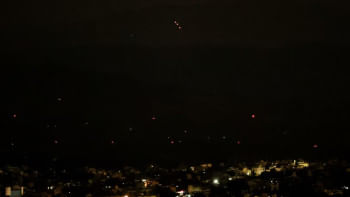Ctg looks for alternative energy

The photograph shows a solar panel installed on the rooftop of Chittagong Zilla Parishad building.Photo: STAR
There is hardly any initiative for introducing solar power as alternative to electricity to meet the severe power crisis in the port city.
Chief Engineer (Generation) of the Chittagong Power Development Board (PDB), Shibu Kumar, Chowdhury said during the peak season the daily demand for electricity in Chittagong is around 600MW against the generation of 350MW.
Researchers believe that introduction of solar energy could greatly solve the problem on the long run. Availability of sunny days during the year could be immensely helpful if it is properly tapped through solar panels.
But for lack of proper planning and guidelines by the authorities concerned is keeping the highly potential alternative energy at bay.
With hills, mountains, rivers and islands, Chittagong possesses a unique diversity in the country. Experts believe that solar panels for electricity, especially in households could be set up at every nook and corner in Chittagong division.
The government declared an allocation of Tk 3500 in 2009 as incentive for installing solar systems in rural areas only. To further encourage the alternative power, it also made the solar panel a tax-free product.
“The incentive should also expand to the urban areas as electricity is consumed in much greater volume in the urban households,” said Afsar Kamal, managing director of Grameen Shakti, one of the largest solar power providers in the country.
The Chittagong Development Authority (CDA) in its building code has made it mandatory for new buildings to install solar panels. The government has directed all public and autonomous offices and its residential complexes to install solar panels.
The reflection of the government initiative is almost non-existent in the urban areas of Chittagong. Of the public offices, only Chittagong Zila Parishad has installed solar panels with a capacity of 85 watts for their internal use. They are now working to install a new panel with a capacity of 540 watts on the same premises.
Zila Parishad has also planned to expand the service to the rural people of Chittagong district. In the first phase It has planned to pick two remote areas of Raozan and Rangunia for the project in the first phase. Twenty-eight and 17 religious institutions will be brought under solar energy project in first phase.
Zila Parishad Deputy Secretary Syeda Sarwar Jahan said they are working in two places where there is little scope in the foreseeable future for installing normal electricity.
Five other private organisations are working in Chittagong division but none is taking any initiative to encourage city dwellers to opt for the alternative energy.
They are Grameen Shakti, Padakhep Manabik Unnayan Kendra, Mukti Cox's Bazar, Purabi and Intregrated Development Foundation (IDF).
Officials said the government does not have any programme to promote solar energy in the urban areas where alternative energy is the urgent need of the time.
Afsar Kamal told The Daily Star that the government should wave taxes from all the materials used in the entire procedure of solar power.
Purabi has installed the largest solar panel at Sandwip upazila with a micro grid solar panel of 100 watts, providing electricity to 400 families.
Mohammed Yunus Mia, a resident of Sandwip Sadar, said solar home system is changing the life of his locality. To make the programme successful in the rural areas it is important to reduce the prices, he added.
The service providers said all parts of solar panels are importing from foreign countries which is making the prices high. Nowadays some private organisations are showing interest to establish an industry for manufacturing solar panels which might bring the prices down.
“Government must formulate a rule to keep provisions for solar system in every home parallel to normal electric service,” said an official of a service provider.
There are different rates of solar panels in the market. The rates depend on capacity of the panels determined by their watts. Solar panels with power ranging from 10 to 130 watts could cost between Tk 8800 and 65400.

 For all latest news, follow The Daily Star's Google News channel.
For all latest news, follow The Daily Star's Google News channel. 



Comments